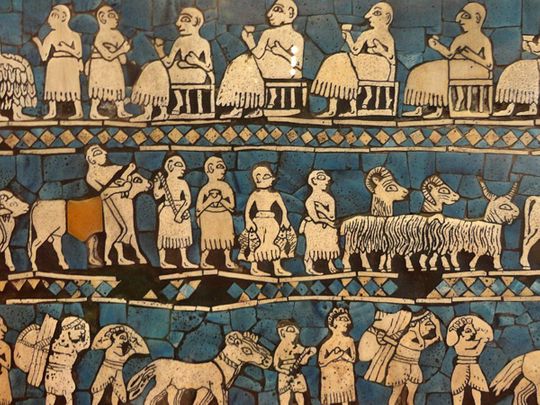
Hundreds of years ago, there existed a ‘land between two rivers’. There began the cradle of civilisation, a region responsible for many of humanity’s best inventions and innovations. Welcome to Mesopotamia.
Click start to play today’s Crossword, where ‘Basra’, part of modern-day Iraq, is the answer to one of the clues.
Mesopotamia was the name given to the region that corresponds to modern-day Iraq, Syria, Lebanon, Turkey and other countries. While sprawling, its civilisation was unlike that of ancient Egypt or Greece. Mesopotamia was seen as a cultural exchange point or trading hub for all civilisations existing in the same period. So, it’s no wonder that the civilisation has had an enormous influence on humanity and history.
Here are a few facts to know about Mesopotamia:
1. Inventors of writing, the wheel, and the city
The invention of writing occurred independently in various parts of the world, but Mesopotamia is one of the first places where it occurred. Here, a writing system called cuneiform existed prior to 3000 BC. It’s also where the wheel was invented, according to the online history encyclopaedia, World History, since it regularly featured in Mesopotamian art, pre-dating 3200 BC. However, one of their most significant inventions is the establishment of the city during the Uruk period. The idea of having a thriving settlement never existed before Mesopotamians developed it as a way to provide settlers shelter from the elements, natural predators, and raiders.
2. It was extraordinarily progressive
The Fertile Crescent is commonly called the ‘cradle of civilisation’, because incredible cultural and technological advancements took place there. Mesopotamians were responsible for inventing agricultural techniques, domesticating animals, developing the concept of time, setting up medical practices, and establishing the study of literature, mathematics, astronomy and science, among many other world-changing improvements.
3. It’s where the first recorded war took place
Since Mesopotamian cities like Sumer held some of the area’s most important resources, they attracted a lot of attention from rival regions. Historians believe the precious resource of water was at the centre of the first recorded war in history, which occurred in 2700 BC, when Sumerian king Enmebaragesi led a military campaign against the region of Elam. He defeated them and carried the spoils back to Mesopotamia.
4. Many of the world’s ‘firsts’ occurred there
Ancient Mesopotamia – particularly Sumer – is responsible for many of the world’s firsts. From creating the first schools, aquariums and library catalogues, to establishing the first legal precedent, literary debates and even the first love song and the first dog collar, Mesopotamian innovations have had a lasting impact – something we see even today.
5. Multinational empire
Mesopotamia also holds the title of being the location of the first multinational empire in the world – the Akkadian empire. Founded by Sargon of Akkad, sometime in mid-2200 BC, the empire stretched from the Arabian Gulf, through the Levant down to Asia Minor, even including the island of Cyprus. Sargon kept his power intact by placing trusted individuals, both men and women, in key political positions throughout the region.
What do you think of this powerful, extraordinary civilisation? Play today’s Crossword and tell us at games@gulfnews.com.



